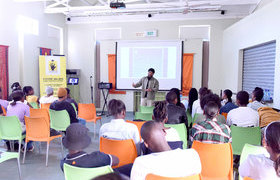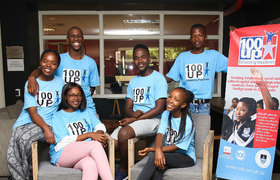100UP Saturday Summer School: a lens on possibilities for disadvantaged learners
09 March 2023 | Story Helen Swingler. Photos Lerato Maduna. Read time 10 min.
To date, the University of Cape Town’s (UCT) pioneering 100UP programme has seen 619 learners from Khayelitsha, Philippi and Mitchells Plain graduate. Of these, 105 have enrolled in postgraduate studies. The knock-on effects of the intervention for these individuals and their communities are “incalculable”, said Dr Medeé Rall.
Dr Rall is the director of the Centre for Extra-Mural Studies in the Development and Alumni Department. The centre runs UCT’s annual Summer School and part of their outreach includes supporting 100UP learners by hosting Saturday Summer School.
These additional lectures introduce 100UP learners to the UCT campus, its lecturers and different fields of study and are designed to stretch the learners’ sense of possibilities and agency, said Rall.
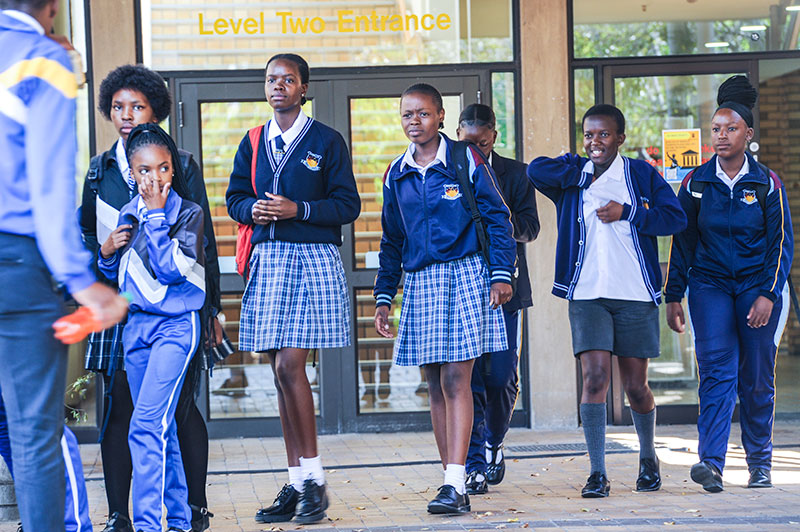
Run by UCT’s Schools Development Unit (SDU), the holistic 100UP programme grooms academically strong, resource-poor learners from Cape Town’s three largest and most resource-poor communities. Learners are selected for a two-year intensive programme in academics and enrichment, based on their final Grade 10 school results.
They are supported in gateway subjects such as mathematics, sciences, and English First Additional Language, which are important for admission to tertiary institutions.
“They are also exposed to workshops and Summer School talks to unlock their thinking and highlight interesting career fields,” said the SDU’s Ferial Parker, senior education specialist and project manager.
And the most recent Saturday Summer School in the Kramer Law Building on 4 March ticked both.
The Big Bang and mind-blowing phenomena
Those who attended had probably never thought of themselves as atomic reincarnations. It came as a startling revelation. But we are all born of star dust, the ancient building blocks of life, and return to star dust in the cycle of life and ongoing creation of the universe, said presenter Emeritus Professor Anwar Mall.
Emeritus Professor Mall was one of two speakers on the day. His presentation was titled “Some Big Scientific Questions”. The second lecture, delivered by the Division of Forensic Medicine and Toxicology’s Dr Iekram Alli, presented an entertaining and educative glimpse of what it takes to become a forensic pathologist.
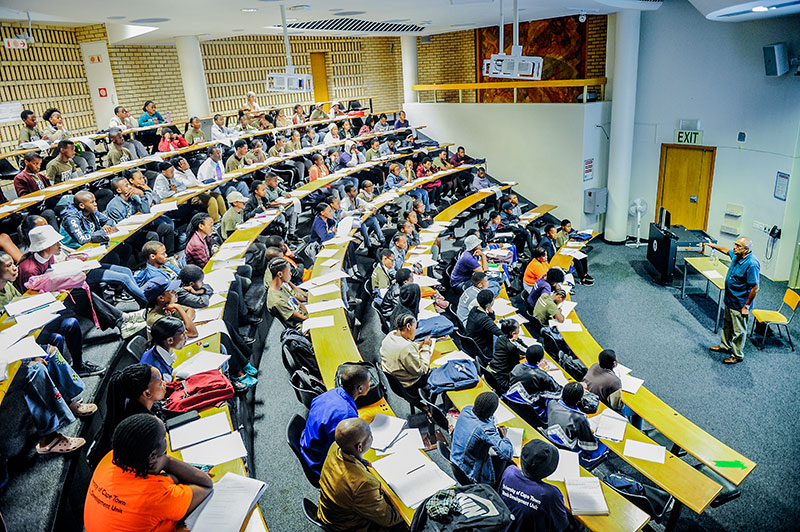
It was all heady stuff for teens on a Saturday morning; 193 participants from 20 high schools in Khayelitsha. But it did the trick, according to learners’ feedback. It expanded their thinking and pricked a sense of possibilities for their lives.
But the most powerful messages from the two UCT presenters were essentially about learning, life, and values – and becoming change agents in their families and communities. The 100UP programme is a vital ‘leg up’ in this respect.
“Both speakers are first-generation university graduates, leading the way for their families and communities,” said Rall. “And both are strong examples of what is possible with commitment, and role models for learners who aspire to study at university.”
The importance of ‘Why?’
A trained medical biochemist, Mall is a retired professor of surgical research. His talk presented a broad sweep of the history and development of science – from the Big Bang through evolution and the discovery of DNA to the enigmas of quantum physics.
Along the way he introduced intellectual giants such as Nicolaus Copernicus, Isaac Newton and Albert Einstein as well as the more recently celebrated Stephen Hawking, Richard Dawkins, and Nick Lane.
Mall posed an intriguing set of questions: How old is the universe? How did life originate? How did life emerge from non-life? What is life? Why is there something instead of nothing?
“These are philosophical, religious and scientific questions,” Mall told his young audience. “Scientists focus on the ‘how?’, but we have recently begun to focus on the ‘why?’”
This is important, Mall said, encouraging the learners to keep asking questions throughout their lives and to embrace lifelong learning.
“There are no right or wrong questions. And there never is a final answer.”
“There are no right or wrong questions. And there is never a final answer. There is always more. And in science, we always look for the evidence. Don’t just accept what people tell you. Question it. Ask for their evidence.”
But the most valuable thing of all is an open mind, he said.
It took open minds to grapple with the estimated 13.8 billion years between the Big Bang and the present.
“It all started with atoms, created after the Big Bang, with non-life eventually becoming the building blocks of life,” Mall said.
Developments in science through the ages were paralleled by developments in thinking and reasoning, giving rise to “the intellectual giants on whose shoulders we stand”.
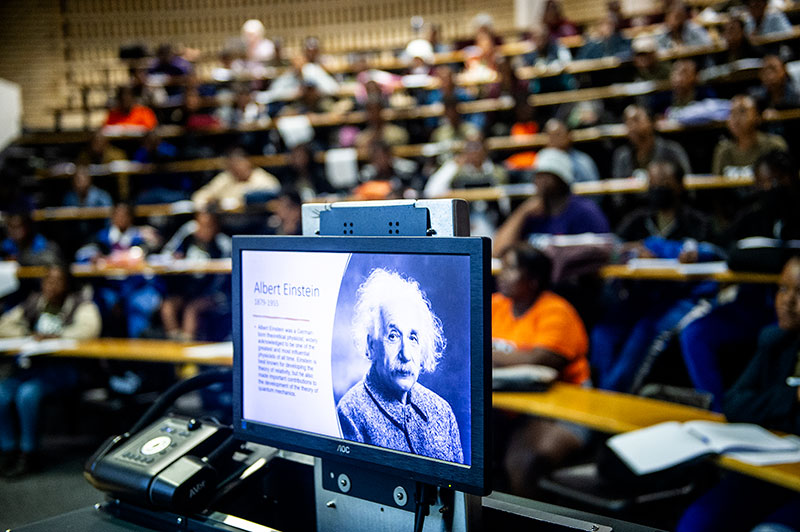
These giants include those from UCT, including five Nobel Prize Laureates and luminaries such as Emeritus Distinguished Professor of Complex Systems in the Department of Mathematics and Applied Mathematics at UCT George Ellis as well as Dr Chris Barnard of the faculty of Health Sciences, who performed first human-to-human heart transplant.
“You want to be famous? Come to this university,” Mall quipped.
Become change agents
From there learners were transported into the world of the forensic pathologist in Dr Alli’s presentation. Alli is based in the Division of Forensic Medicine and Toxicology.
He stunned his young audience by telling them that he had studied for 19 of his 49 years; more years than most of the learners had lived.
He didn’t come from a life of privilege either, he said. His father worked in a factory. He was the eldest of three brothers and each helped the younger sibling to attend university. One became a dentist and the other a pharmacist.
But opportunity was the key, he added.
“We all had the same opportunities. If I failed, the only one to blame was me.”
“Why did I work so hard? I realised at school that it didn’t matter that I wasn’t the child of a doctor or a teacher. We all had the same opportunities. If I failed, the only one to blame was me.
“It’s a simple choice,” he added. “You can jol now and pay the price for the rest of your life or work hard now and reap the dividends for the rest of your life.”
It was also clear that Alli loves his work. He introduced learners to the common branches of forensic science, from pathology to psychiatry, ballistics and odontology (his area of expertise) to toxicology.
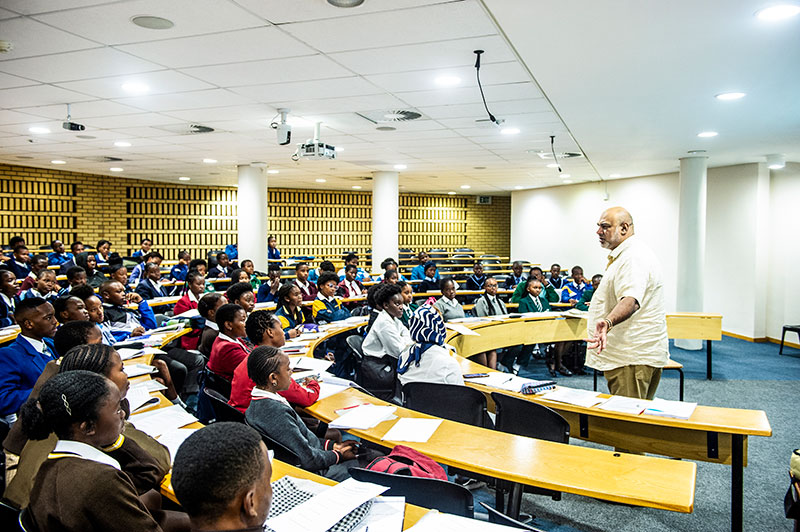
“But you are exposed to a lot of things: trauma, worms, insects, rotting bodies, burnt bodies. You’re exposed to radioactive materials, unknown viruses and bloodborne diseases. It’s not a field for everybody. Mentally it requires a lot. You work irregular hours. And you are always on call.”
However, you reap the rewards, Alli said, jingling the keys of a luxury car (whistles and applause from learners). He added, “Yes, medicine is a long and expensive course, but it sets you up to earn for the rest of your life.”
“You must have a curious mind. You want to know things. You want to investigate things.”
But his parting message was a strong injunction to the learners.
“Don’t take your opportunities for granted … Do something with your life. Your future is in your hands. When you make your life, you make it for yourself, your family and your children.
“If you are the first in your family to attend university, you are the start of a new generation in your family. If you are the eldest and you have siblings, set the example.”
Stars in their eyes
The feedback from learners afterwards showed how much they had appreciated the speakers and content.
“I just love how my brain was stimulated,” said one. “I’m interested [now] in learning more about science.”
Another wrote: “I learnt that it takes very much effort to become what you want, and you must sacrifice and study hard.”
“They were very informative, and they opened my mind to more careers other than traditional teachers or lawyers,” said a third.
Another wrote, “I learnt that as a person you have to be curious, be willing to learn new things.”
“I learnt about classical physics and how it helps humanity to discover more about the universe,” a fifth noted.
For another learner, it was all about the approach. “Both were very funny and interesting.”
 This work is licensed under a Creative Commons Attribution-NoDerivatives 4.0 International License.
This work is licensed under a Creative Commons Attribution-NoDerivatives 4.0 International License.
Please view the republishing articles page for more information.








